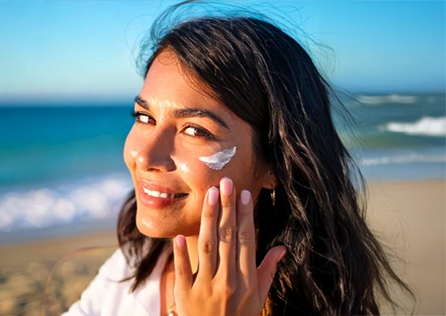Do you want to enjoy spending time in the sun without worrying about skin damage? If yes, wear the best sunblock every day! Wearing sunscreen will protect your skin from UV rays. While sunscreens cannot block 100% radiation, they allow you to be outdoors for a longer time until you have to reapply. Along with protecting your skin, sunscreens reduce the chances of developing sunspots, giving you a clearer skin tone. They also prevent you from developing skin diseases like skin cancer, maintaining your skin and general health.
Why is it Important to Use Sunscreen?
Here’s why you should always wear sunscreen.
Protection Against Sun Radiation
Sun's radiation can harm the skin significantly. But a good sunscreen can shield the skin against damaging UV rays, which raises the potential for skin damage and skin cancer. Applying sunscreen to your face and other areas of your body can help protect your skin. This will prevent skin damage and sunburn.
Reduce the Chances of Skin Diseases
Sunscreen should be a staple for everyone trying to avoid skin conditions because it can save you from skin cancer and so many other diseases. Using sunscreen is an easy way to prevent major skin damage. It allows you to reduce your chances of getting skin diseases, keeping you fit and healthy.
Prevents Early Aging
Sun damage causes the skin to age too quickly. UV radiation is the source of the skin's discoloration. Sun exposure can worsen wrinkles and cause drooping skin because it breaks down collagen. But the good news is that people who wear sunscreen are far less likely to show signs of early aging than those who don't. Sunscreen is a fantastic technique to let your skin age slowly without suffering from serious UV damage, which is something that many people wish to do.
Minimize Inflammation
Our skin may become painfully red and irritated when exposed to UV radiation. Those who suffer from skin conditions like rosacea or psoriasis may find this particularly difficult. However, regular use of sunscreen reduces inflammation caused by damaging UV radiation.
The Best Sunblock for Oily Skin
Many people find it challenging to find the right sunscreen for oily skin. The first step is to look for sunscreens that are labeled as "oil-free" or "non-comedogenic." By providing sun protection without blocking pores or giving shine to the skin, these products avoid the common problems associated with oily skin.
After that, you should look for sunscreen cream for oily skin with a lightweight texture. Sunscreen lotion for oily skin with formulations that are gel-based, or fluid are the best options because they absorb into the skin easily and don't leave a greasy residue. You can also look for sun protection for oily skin that has a mattifying impact if you're prone to excessive oiliness. However, don't forget about broad-spectrum protection when choosing sunscreen for greasy skin. Choose sun lotion for oily skin that protects your skin from UVB and UVA radiation by providing broad-spectrum coverage.
Here are some tips for using the best sunscreen for oily skin.
- To provide the best foundation for applying sunscreen cream oily skin, start with a thorough cleansing to remove excess oil and impurities from the skin.
- At least fifteen minutes before being in the sun, apply the best SPF for oily skin to all exposed skin areas. Don't cut corners on the product as proper covering is essential to protect the skin.
- The effectiveness of good sunscreen for oily skin deteriorates with time, particularly when exposed to perspiration or water. Apply the best sunblock for oily skin again every two hours or more often if you're doing something that involves water.
- To remove the best sunscreen cream for oily skin completely yet gently at the end of the day, use a good cleanser. By taking this step, pore congestion is avoided, and the skin may breathe normally all night.
The Best Sunscreen for Dry Skin
Here are some tips for choosing the best sunblock for dry skin.
- Moisturizing components like ceramides should be included in sun cream for dry skin. By retaining moisture at the skin's layers, these substances in the sunscreen cream for dry skin will aid in keeping the skin hydrated all day.
- Certain sunscreens contain harsh ingredients that can irritate and dry out the skin, such as alcohol or perfumes. It's crucial to choose sunscreen lotion for dry skin free of these substances. Sun protection for dry skin without alcohol or smell is safer for skin that is dry and sensitive.
- You should choose sunscreens with lotion or cream textures for dry skin, which are thicker in consistency if you have dry skin. The best sunscreen lotion for dry skin or the best sunscreen cream for dry skin will maintain skin's moisture better.
- When choosing dry skin sunscreen cream, you should look for one that doesn’t have fragrance. The best sun protection for dry skin without fragrances will prevent your skin from feeling itchy or dry.
Facts and Myths About Sunscreen
Here are some facts and myths about sunscreens you must know.
Myth
Some people think that they only have to apply sunscreen on sunny days. UV radiation, not temperature, is what causes sun damage, so even when the sun isn't out, you can still harm your skin. In reality, UV rays can pass through clouds and become much stronger as a result of reflection.
Fact
All skin types can be harmed by the sun. Exposure to UV radiation from the sun can harm skin permanently, regardless of skin type.
Fact
No sunscreen can completely prevent the sun's rays. Additionally, SPF has no bearing on how long you'll be protected from UV rays.
Myth
No sunscreen is waterproof. However, there are water-resistant sunscreens. Even with water-resistant sunscreens, you have to reapply after a while in water to protect your skin.
